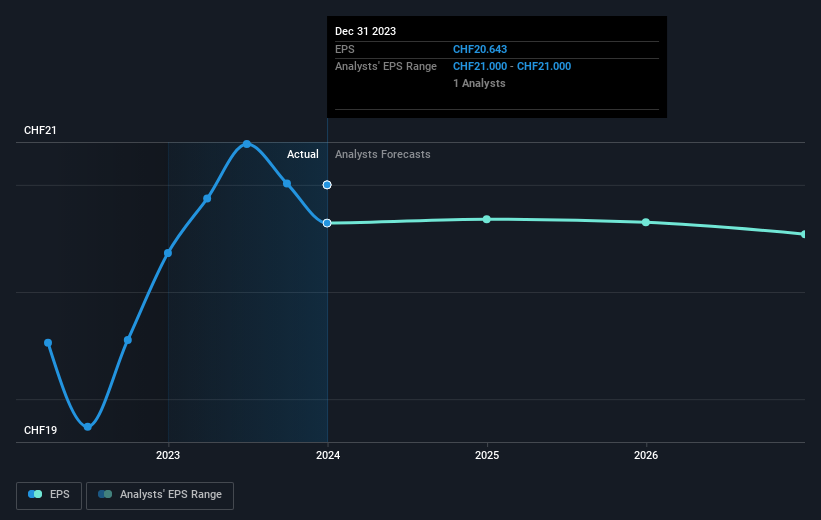- Switzerland
- /
- Food
- /
- SWX:BELL
1.0% earnings growth over 3 years has not materialized into gains for Bell Food Group (VTX:BELL) shareholders over that period

Many investors define successful investing as beating the market average over the long term. But the risk of stock picking is that you will likely buy under-performing companies. We regret to report that long term Bell Food Group AG (VTX:BELL) shareholders have had that experience, with the share price dropping 12% in three years, versus a market decline of about 5.1%.
Since Bell Food Group has shed CHF50m from its value in the past 7 days, let's see if the longer term decline has been driven by the business' economics.
See our latest analysis for Bell Food Group
In his essay The Superinvestors of Graham-and-Doddsville Warren Buffett described how share prices do not always rationally reflect the value of a business. By comparing earnings per share (EPS) and share price changes over time, we can get a feel for how investor attitudes to a company have morphed over time.
Although the share price is down over three years, Bell Food Group actually managed to grow EPS by 3.0% per year in that time. Given the share price reaction, one might suspect that EPS is not a good guide to the business performance during the period (perhaps due to a one-off loss or gain). Or else the company was over-hyped in the past, and so its growth has disappointed.
Given that EPS is up and the share price is down, it seems clear the market is less excited about the business than it was. Of course, this could spell opportunity because if the EPS growth continues long term, it seems very likely the share price will rise too.
You can see below how EPS has changed over time (discover the exact values by clicking on the image).

This free interactive report on Bell Food Group's earnings, revenue and cash flow is a great place to start, if you want to investigate the stock further.
What About Dividends?
When looking at investment returns, it is important to consider the difference between total shareholder return (TSR) and share price return. The TSR incorporates the value of any spin-offs or discounted capital raisings, along with any dividends, based on the assumption that the dividends are reinvested. So for companies that pay a generous dividend, the TSR is often a lot higher than the share price return. We note that for Bell Food Group the TSR over the last 3 years was -5.4%, which is better than the share price return mentioned above. This is largely a result of its dividend payments!
A Different Perspective
While the broader market gained around 9.3% in the last year, Bell Food Group shareholders lost 0.9% (even including dividends). Even the share prices of good stocks drop sometimes, but we want to see improvements in the fundamental metrics of a business, before getting too interested. Longer term investors wouldn't be so upset, since they would have made 1.1%, each year, over five years. It could be that the recent sell-off is an opportunity, so it may be worth checking the fundamental data for signs of a long term growth trend. It's always interesting to track share price performance over the longer term. But to understand Bell Food Group better, we need to consider many other factors. For instance, we've identified 3 warning signs for Bell Food Group (1 shouldn't be ignored) that you should be aware of.
But note: Bell Food Group may not be the best stock to buy. So take a peek at this free list of interesting companies with past earnings growth (and further growth forecast).
Please note, the market returns quoted in this article reflect the market weighted average returns of stocks that currently trade on Swiss exchanges.
Valuation is complex, but we're here to simplify it.
Discover if Bell Food Group might be undervalued or overvalued with our detailed analysis, featuring fair value estimates, potential risks, dividends, insider trades, and its financial condition.
Access Free AnalysisHave feedback on this article? Concerned about the content? Get in touch with us directly. Alternatively, email editorial-team (at) simplywallst.com.
This article by Simply Wall St is general in nature. We provide commentary based on historical data and analyst forecasts only using an unbiased methodology and our articles are not intended to be financial advice. It does not constitute a recommendation to buy or sell any stock, and does not take account of your objectives, or your financial situation. We aim to bring you long-term focused analysis driven by fundamental data. Note that our analysis may not factor in the latest price-sensitive company announcements or qualitative material. Simply Wall St has no position in any stocks mentioned.
Have feedback on this article? Concerned about the content? Get in touch with us directly. Alternatively, email editorial-team@simplywallst.com
About SWX:BELL
Bell Food Group
Engages in the processing of meat and convenience products in Europe.
Undervalued with excellent balance sheet.

